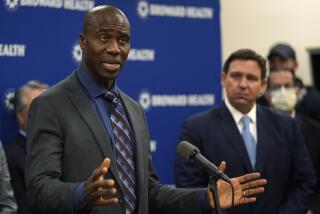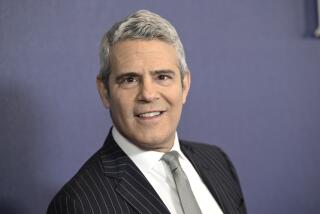Articles Minimizing Risk of AIDS Assailed by Koop
- Share via
WASHINGTON — Surgeon General C. Everett Koop on Friday chided health professionals who refuse to treat AIDS patients and criticized articles minimizing the risk of heterosexual transmission of the fatal disease.
“It is just not true that there is no danger from normal vaginal intercourse,” Koop told a House subcommittee. “What is unknown is the level of danger.”
He cited recent articles, including one in Cosmopolitan magazine, that he said wrongly led women to believe they were not at risk.
Koop said the Cosmopolitan article “seems to split the scientific community.” But he said federal public health officials agree that heterosexuals should be aware that they are at risk.
“There is always a danger whenever people engage in casual sex outside the marriage relationship, even if their promiscuity is heterosexual,” Koop said at a hearing of the Energy and Commerce health subcommittee.
Heterosexuals account for only 4% of current acquired immune deficiency syndrome cases, but Koop said that that proportion is expected to rise to 5% in the 1990s.
Koop said medical personnel generally have responded well to the AIDS crisis, but he expressed concern about a minority who “refuse not only to treat persons with AIDS but also turn away patients alleged to be from population groups identified with those two high-risk behaviors: that is, homosexual and bisexual males and intravenous drug abusers.”
He said that course is “historically uncharacteristic and is unworthy of anyone in the health or social service professions.”
Those who turn away AIDS patients use the excuse that the disease is fatal and contagious, Koop said. “But the plain fact is that the risk of contracting (AIDS) from an infected patient is extremely small and nearly always preventable.”
Few Infections
Of nearly 7 million health professionals in the country, Koop said, fewer than a dozen became infected with the AIDS virus while doing their jobs and, in most cases, that exposure could have been prevented if the person had followed guidelines published five years ago by the Centers for Disease Control in Atlanta.
CDC Director James Mason, another witness, said that more than 15 million Americans are being tested anonymously each year for AIDS through blood banks and the military and in 30 communities.
He said more anonymous testing should be done to get a better estimate of the extent of AIDS infection in the United States, but he rejected a proposal by Rep. William E. Dannemeyer (R-Fullerton) that anyone coming in contact with the health system be tested.






